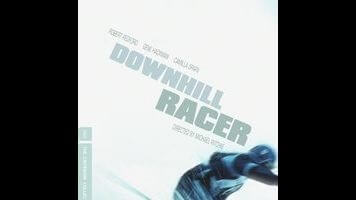For a brief, glorious period, roughly from the mid-1960s through the mid-1970s, Hollywood execs lost their minds and began funding genuine art movies. In particular, they became shockingly unconcerned with one of the key questions suits obsessively ask regarding any film intended to connect with a large audience and make a profit: Is the protagonist likeable? Consequently, the “New Hollywood” movement is replete with charismatic assholes, many of them played by Jack Nicholson, Robert De Niro, Dustin Hoffman, or Gene Hackman. Perhaps the most extreme example, however—a completely uncharismatic asshole—can be found in Michael Ritchie’s 1969 debut feature, Downhill Racer, which receives a Blu-ray upgrade from Criterion this week. Hackman appears in a supporting role, but it’s the young Robert Redford, not yet a superstar (his commercial breakthrough, Butch Cassidy And The Sundance Kid, had been released just two weeks earlier), who boldly divests himself of just about every quality that might make his character slightly appealing. In fact, he and Ritchie push the concept so far that they effectively render the movie inert.
Like many New Hollywood films, Downhill Racer comes fairly close to being plotless, though being a sports movie does provide it with a built-in narrative arc. Redford plays David Chappellet, an American skier who’s summoned to join the U.S. team in Europe after one of its top athletes is badly injured in a crash. Extremely gifted, but arrogant and aloof, Chappellet resents having to start at the bottom; when head coach Eugene Claire (Hackman, who was himself still two years away from The French Connection and major stardom) informs him that he’s receiving a late starting position in his first race, he simply refuses to take part. And while he quickly proves his worth, he doesn’t exactly endear himself to his teammates—or to anyone else, frankly. His romance with a woman named Carole (Camilla Sparv), who works as the assistant to a ski manufacturer, constitutes the film’s primary subplot, and mostly serves to demonstrate Chappellet’s self-regard and lack of empathy. He wants to win. Nothing else matters, or even registers.
As a character study—and it doesn’t really function as anything else, despite the skiing action—Downhill Racer, written by novelist James Salter (adapting Oakley Hall’s 1963 novel The Downhill Racers), never quite gets inside Chappellet’s head. Redford commits wholeheartedly to inhabiting a colossal prick; he’s arguably less communicative and expressive here than he’d be 44 years later in All Is Lost, which strands him alone on screen throughout, with almost zero dialogue. But unlike, say, Bobby Dupea (Nicholson’s character in Five Easy Pieces) or Harry Caul (Hackman’s character in The Conversation), Chappellet never thrums with a frustrated inner life nor finds his circumscribed existence unexpectedly challenged. He’s so stunted that he’s fundamentally uninteresting, and he never changes one iota. Only a brief trip to his home in small-town Oregon, where he’s received with open scorn by his father (Walter Stroud), a taciturn farmer, suggests (rather too neatly) a degree of psychological complexity. Hall and/or Salter seem unwilling to turn Coach Claire into a surrogate father figure, however, so even that reductive prospect goes untapped.
The nature of downhill skiing compounds the problem. Movies about runners depict the intense bodily exertion involved; movies about auto racing generate excitement from high-speed competition and the ever-present threat of a wreck. Skiiers, however, head down a slope one at a time, and they all look to be traveling at roughly the same speed (which they are, really; shaving off fractions of a second will often be the difference between winning and losing). Ritchie gets some first-person shots from Chappellet’s perspective—impressive, given that even smaller movie cameras weighed about 50 pounds back then—but most of the races can only derive suspense from an announcer remarking that so-and-so has completed the first half of the course faster than any other skier so far. Hackman is generally reduced to standing on the sidelines, looking grim; he gets one meaty scene in which he chews out Chappellet, but does little onscreen coaching and is forgotten for long stretches. (Dabney Coleman, who’s barely recognizable with a full head of hair, gets the best line, as Claire’s assistant: When another skier complains that Chappellet isn’t a team player, Coleman sensibly replies “Well, it’s not exactly a team sport, is it?”) Nobody can accuse Downhill Racer of lacking artistic integrity. Trouble is, artistic integrity is all it has to offer.
